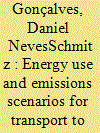| Srl | Item |
| 1 |
ID:
169890


|
|
|
|
|
| Summary/Abstract |
To achieve the mitigation targets discussed under the Paris Agreement, countries must develop studies that not only estimate baselines based on historical data of greenhouse gas (GHG) emissions and energy use, but that also project them considering different levels of ambition and political commitment. This study aims to develop and model scenarios of energy use and GHG emissions from the transport sector until 2030, considering the Brazilian Nationally Determined Contribution (NDC). Three scenarios were developed based on different political commitment. The method is based on a bottom-up approach, requiring multi-sectoral collaborative efforts to not only explain the direct energy use, but also balance the transportation activity and energy between the transport modes, justifying each case in terms of development stage and energy supply capacity. Here, transport sector has been further split up into the highest sector level detail available. At the maximum, GHG emissions could be reduced by 15% (29 Mt CO2e), achieved in scenario 3, whilst there are increases on emissions in scenario 2 (5% or 10 Mt CO2e) and scenario 1 (21% or 42 Mt CO2e). It implies that Brazil has the potential to ratchet up the mitigation targets discussed under the Paris Agreement of the UNFCCC.
|
|
|
|
|
|
|
|
|
|
|
|
|
|
|
|
| 2 |
ID:
176788


|
|
|
|
|
| Summary/Abstract |
Energy use in British homes is a significant contributor to national greenhouse gas emissions, and the improvement of energy efficiency in residential buildings has long been an important topic in policy discussions. The lack of investment in energy-saving measures is particularly challenging in the private rented sector, and there are significant research and data gaps in understanding the retrofit behaviour of private landlords. In this study, we present the results of a detailed survey on retrofit behaviour of 1069 British private landlords. The survey assesses the engagement of landlords with 18 different energy efficiency measures, as well as their attitudes, perceptions, norms and a number of other characteristics. We use the data collected in the survey to produce 7 behavioural “typologies” of landlord retrofitters, by clustering respondents based on their socio-demographic and business characteristics. In addition to providing descriptive evidence of landlords' retrofit behaviour, our results reveal a number of opportunities for segmenting the landlord population into target groups for future policy interventions. By tailoring retrofit incentives to the needs and motivations of these groups, policy-makers can effectively engage landlords with specific energy-saving technologies, increasing the likelihood of retrofit uptake and accelerating the transition to an energy-efficient private rented sector.
|
|
|
|
|
|
|
|
|
|
|
|
|
|
|
|